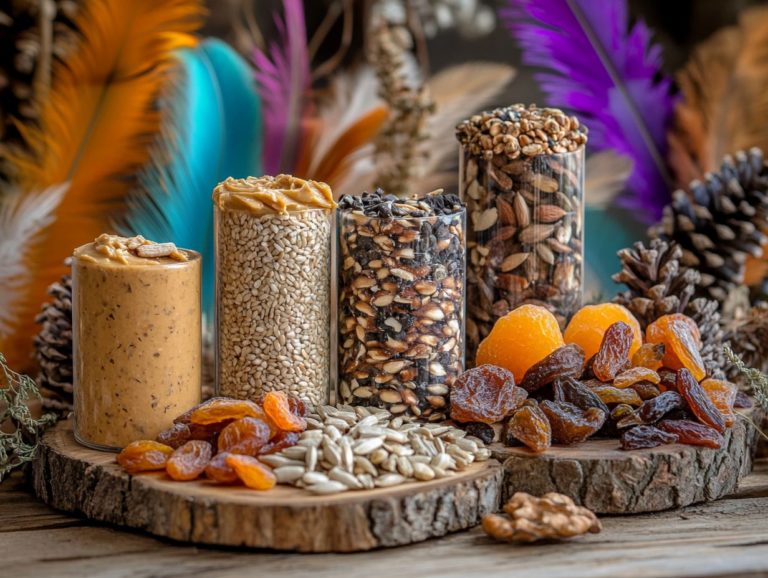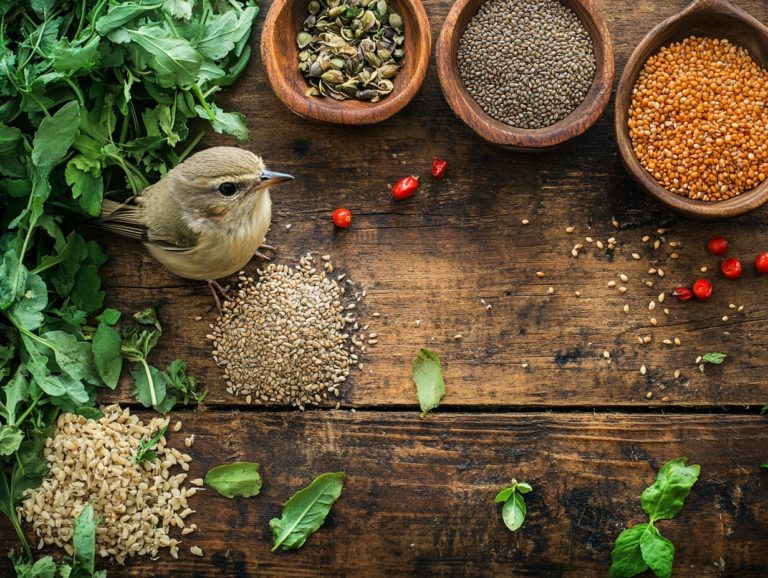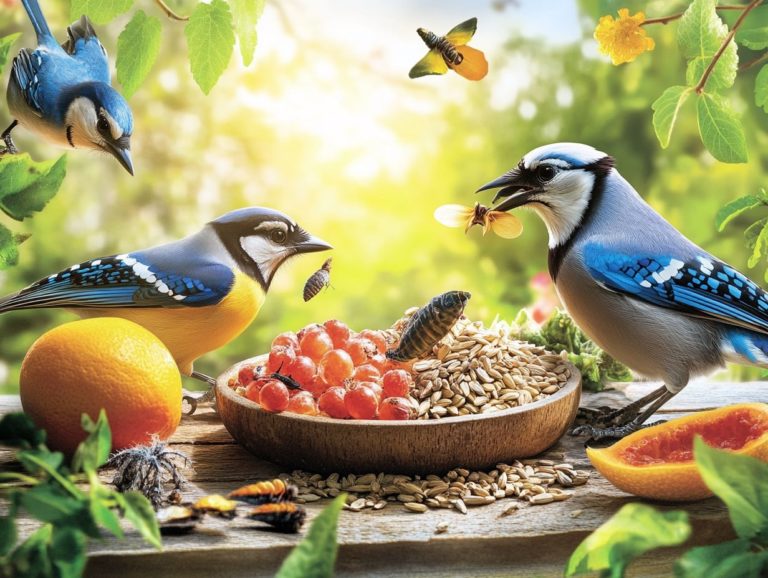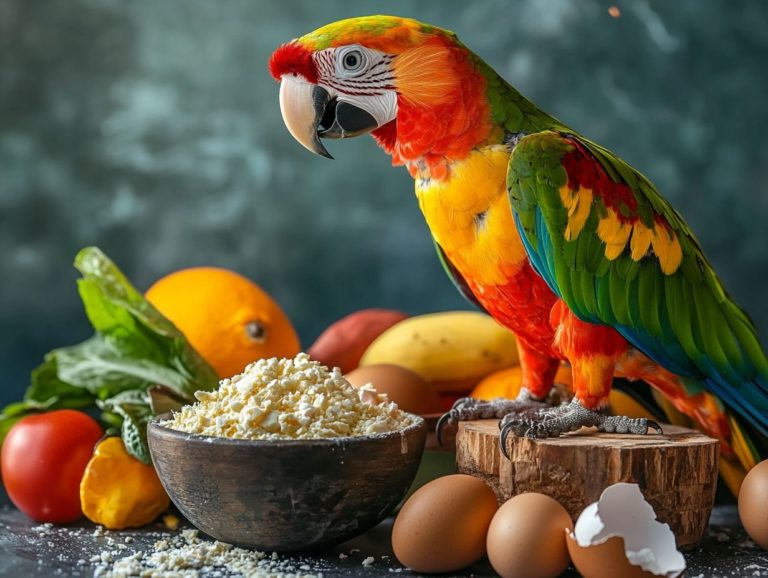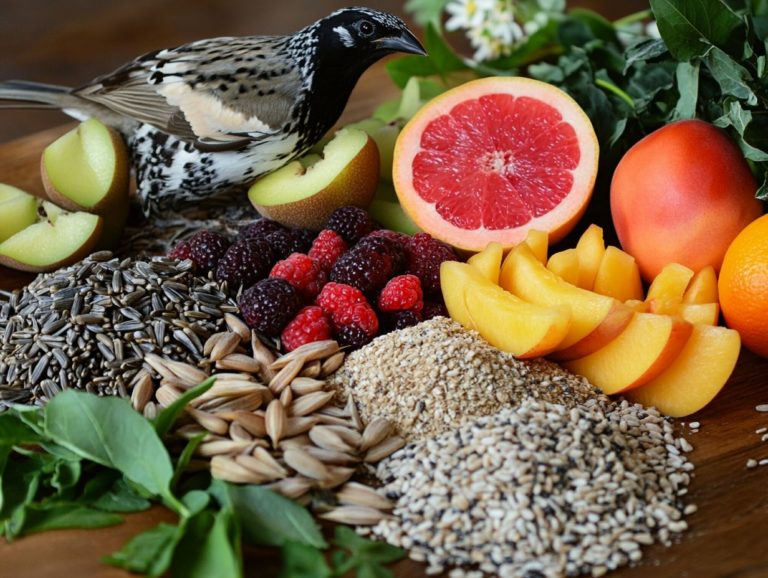5 Health Benefits of Vegetables for Pet Birds
Keeping your pet birds healthy and happy involves much more than simply offering seeds and pellets; a well-rounded diet is absolutely essential.
Incorporating vegetables into their meals is crucial for providing vital nutrients your feathered friends need. These greens not only add variety but also boost their immune systems and promote healthy skin, delivering numerous benefits.
This article explores five key advantages of adding vegetables to your pet bird’s diet, along with practical tips on safe choices, appropriate serving sizes, and effective ways to introduce these nutritious treats.
Discover how you can enhance your bird’s well-being through the power of veggies!
Contents
- Key Takeaways:
- 1. Provides Essential Nutrients for Optimal Health
- 2. Helps with Digestion and Gut Health
- 3. Supports a Healthy Immune System
- 4. Aids in Weight Management
- 5. Promotes Healthy Skin and Feathers
- What Types of Vegetables Are Safe for Pet Birds?
- Frequently Asked Questions
- What are the top 5 health benefits of feeding vegetables to my pet bird?
- Discover the Best Vegetables for Your Pet Bird!
- Feed Your Pet Bird Vegetables Daily for a Vibrant and Healthy Life!
- Are Raw or Cooked Vegetables Better for Pet Birds?
- Can I Feed My Pet Bird Fruits Instead of Vegetables for the Same Health Benefits?
- Are There Any Vegetables That Are Toxic to Pet Birds?
- Ready to Be a Great Bird Parent?
Key Takeaways:
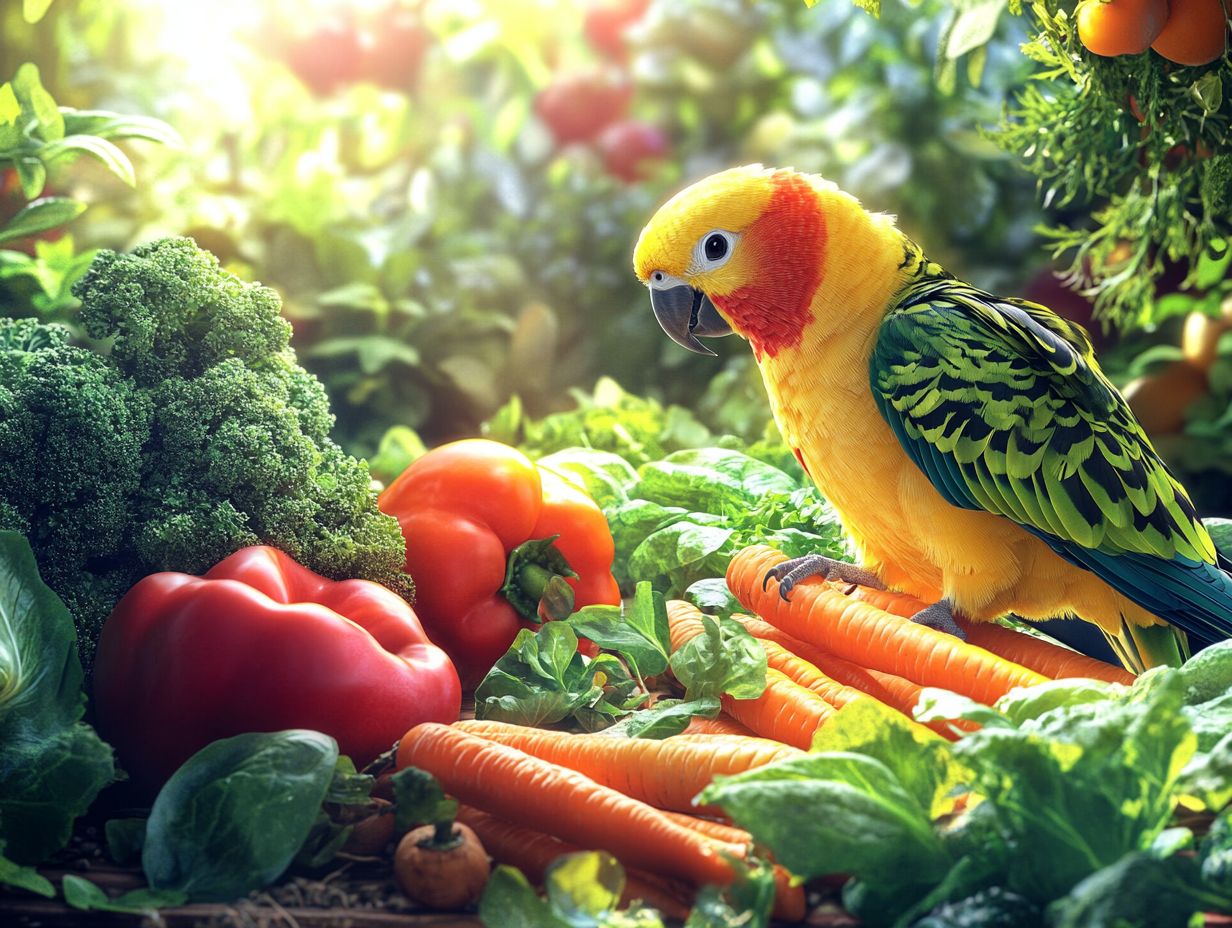
- Including vegetables in a pet bird’s diet provides essential nutrients for optimal health, aiding in digestion, gut health, and a strong immune system.
- Regularly consuming vegetables helps with weight management and promotes healthy skin and feathers for pet birds.
- It is important to introduce vegetables gradually and monitor for signs of nutrient deficiency since a balanced diet with vegetables is crucial for pet bird health.
1. Provides Essential Nutrients for Optimal Health
Providing essential nutrients is vital for the optimal health of your pet birds. Make sure they receive a balanced diet enriched with important vitamins and minerals, which prevents them from not getting enough nutrients and promotes overall wellness.
A well-rounded diet tailored to the specific needs of each bird species can significantly influence their long-term vitality. Vitamins A, D, C, and E are critical for supporting immune function, enhancing feather quality, and maintaining healthy eyesight.
Calcium is key for bone structure and reproductive health, while other minerals support the proper functioning of various bodily systems. By understanding the unique dietary requirements of different species, you can create a nutrition plan that nurtures both their physical health and behavioral well-being, allowing your feathered companions to thrive.
2. Helps with Digestion and Gut Health
Adding fresh vegetables to your pet bird’s diet can greatly improve their digestion and gut health. These foods provide the essential fiber needed for a well-functioning digestive system.
This is especially true for fiber-rich raw foods, like leafy greens, which maintain optimal digestive function. A balanced diet that emphasizes fresh vegetables not only contributes to better gut health but also supports vital processes in your bird’s body.
The natural fibers in these foods help regulate bowel movements, reduce the risk of gastrointestinal issues, and promote a thriving microbiome. Plus, the antioxidants and essential vitamins found in greens elevate overall nutritional intake, ultimately leading to improved vitality and longevity for your feathered companions.
3. Supports a Healthy Immune System
A diet rich in vitamins, especially vitamin C and E, is essential for a healthy immune system in your pet birds. This strengthens their defenses against illness and contributes significantly to their overall longevity.
Antioxidants found in colorful vegetables think bell peppers, kale, and carrots are crucial for combating oxidative stress, helping to maintain optimal health. By incorporating a diverse selection of vegetables into their meals, you can greatly enhance your feathered friends’ well-being.
The expertise of avian veterinarians is invaluable in this journey. They can assess your birds’ specific nutritional needs and offer guidance on suitable dietary choices. This collaboration ensures your bird’s immune system remains robust, making them more resilient to potential health threats.
Start today by introducing fresh greens to your bird s meals and watch them thrive!
4. Aids in Weight Management
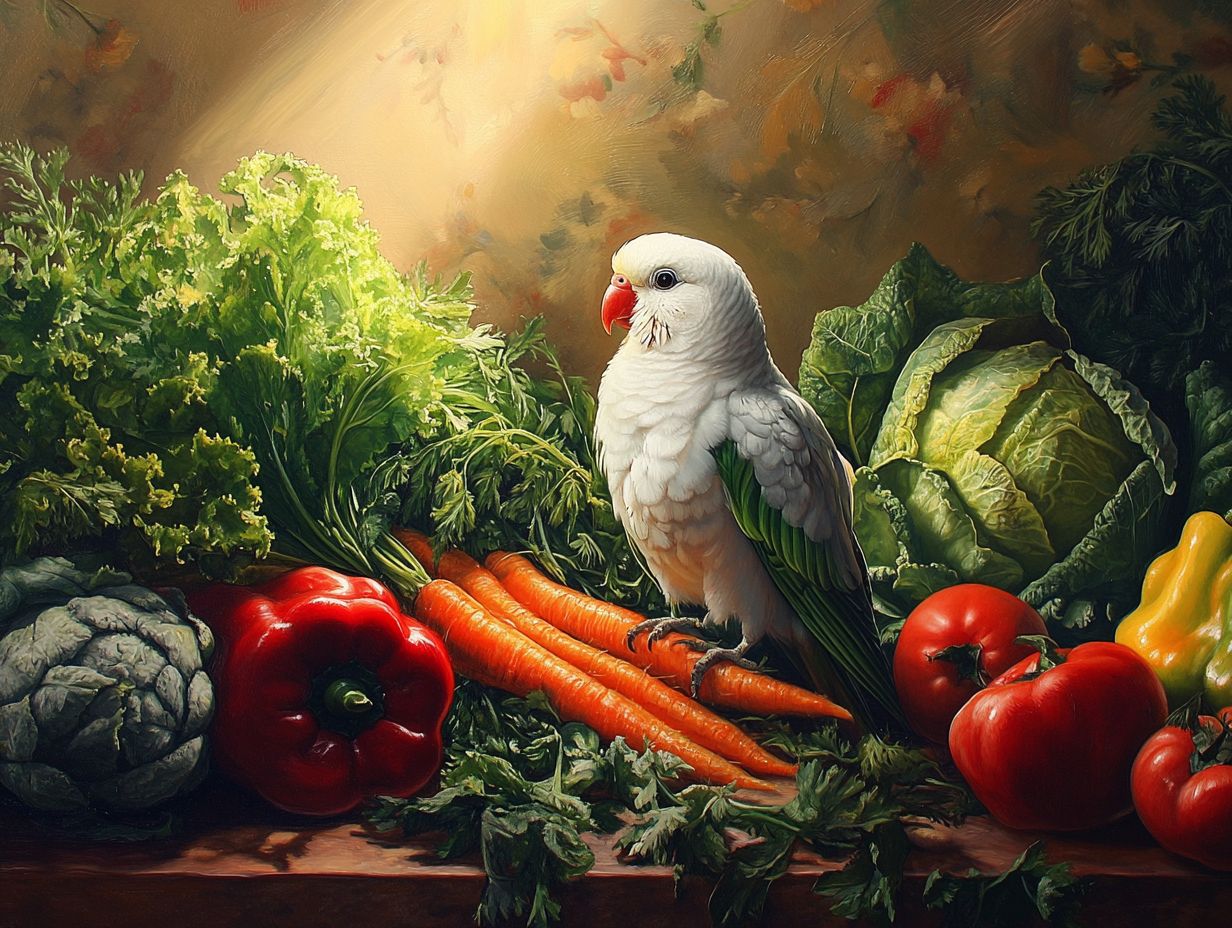
A well-balanced diet rich in fresh vegetables can significantly aid in your pet bird’s weight management, especially for parrots, by meeting their energy needs without tipping the scales toward obesity.
Incorporating a diverse array of fresh vegetables into your bird’s feeding routine not only delivers essential nutrients but also supports healthy digestion and hydration. Keep an eye on their calorie intake to prevent weight gain, as these spirited creatures can easily overindulge, particularly when high-fat seeds and treats come into play.
To craft an effective balanced diet plan, consider allocating specific portions of vegetables alongside their regular feedings. This approach ensures that their overall caloric intake stays in check. By prioritizing low-calorie options like leafy greens, you can help your avian companions maintain a healthy weight while enjoying a vibrant and flavorful menu.
5. Promotes Healthy Skin and Feathers
A diet abundant in essential nutrients, including vitamin A and adequate protein, is crucial for fostering healthy skin and feathers in your pet birds. This enhances their overall appearance and well-being.
Vitamin A is essential for maintaining the integrity and health of feathers, warding off issues like molting (the process of shedding feathers) and feather plucking. To ensure your feathered friends receive this vital nutrient, think about incorporating colorful fruits and vegetables into their diet, such as:
- Carrots
- Sweet potatoes
- Leafy greens
These are all fantastic sources. Offering a balanced pellet diet ensures they receive a mix of essential vitamins and minerals. Regularly monitor their water intake to enhance nutrient absorption, contributing to vibrant plumage and resilient skin.
What Types of Vegetables Are Safe for Pet Birds?
Understanding which vegetables are safe for your pet birds is essential. Certain options like broccoli, carrots, spinach, snap peas, and peppers provide crucial nutrients and keep your feathered friends safe.
By offering a varied diet rich in these vegetables, you can significantly enhance their overall well-being. For example, broccoli is a powerhouse of vitamins K and C, while carrots deliver beta-carotene for healthy eyesight. Spinach is a great source of iron, vital for red blood cell production, and snap peas boast a wealth of fiber and antioxidants.
However, some vegetables, like avocado and rhubarb, are harmful to birds and should be avoided.
To ensure safety, always wash the vegetables thoroughly and slice them into manageable pieces for easy dining. Avoid adding salt or spices, as these can be detrimental to their sensitive systems.
How Much Vegetables Should Be Included in a Pet Bird’s Diet?
Determining the right amount of vegetables in your pet bird’s diet is crucial for meeting their nutritional needs. Recommendations can vary significantly based on species and overall health.
Generally, fresh vegetables should account for about 20-30% of your bird’s daily intake. However, this guideline can shift depending on the specific dietary requirements of different bird species.
Some species flourish on a higher ratio of leafy greens, while others thrive on a vibrant mix of colorful vegetables rich in carotenoids. Individual factors such as your bird’s age, activity level, and health status also play essential roles in shaping these dietary recommendations.
A bird recovering from illness might require a different nutritional profile compared to a healthy, active companion. This underscores the intricate nature of avian nutrition.
Always consult a vet for personalized dietary advice tailored to your bird’s unique needs.
What Are the Best Ways to Introduce Vegetables to a Pet Bird’s Diet?
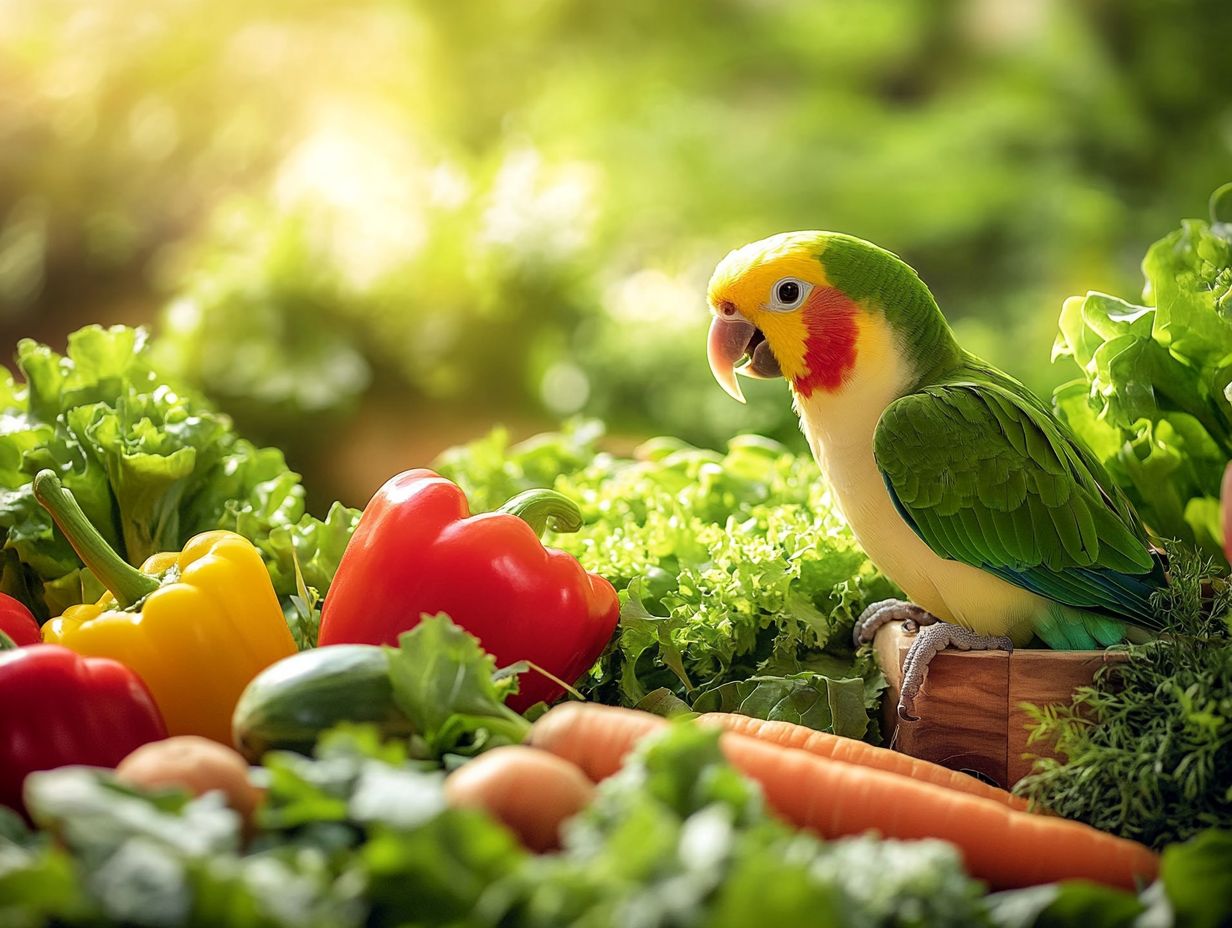
Introducing vegetables into your pet bird’s diet requires patience and careful methods. This ensures they embrace nutritious options without stress!
Start with small portions and gradually increase the amounts. This helps your bird become familiar with new flavors and textures. Presentation is key; vibrant, cut-up pieces catch their attention more than whole vegetables.
Opt for organic options when available to protect against harmful pesticides. Keep an eye on your bird for any adverse reactions, such as changes in behavior or digestion. These can provide important insights into their preferences and tolerances.
Engage their curiosity through play or foraging activities. This can transform the introduction process into a delightful experience for both you and your feathered friend!
What Are the Signs of a Nutrient Deficiency in Pet Birds?
Recognizing signs of nutrient deficiency in your pet bird is essential for their health. Early detection can prevent serious health issues related to malnutrition.
Watch for indicators like dull feathers, fluffed plumage, lethargy, or changes in behavior such as increased aggression or withdrawal. These symptoms may indicate your bird is missing crucial vitamins and minerals.
Consult an avian veterinarian a vet specialized in birds who can diagnose and recommend dietary adjustments tailored to your bird’s needs. A well-crafted diet can enhance your bird’s wellbeing, allowing it to thrive with vibrant feathers and optimal energy levels!
Can Vegetables Be Harmful to Pet Birds?
Many vegetables are safe for pet birds, but some can pose serious risks. Know which vegetables to avoid!
- Avocado: Contains persin, which is highly toxic.
- Garlic: Can disrupt digestive systems.
- Tomato: Contains solanine, harmful in large amounts.
These specific vegetables can introduce toxins or irritants, leading to respiratory problems and gastrointestinal distress. Conduct thorough research before introducing new foods into your pet’s diet. Prioritize the well-being and safety of your feathered companions!
How Can a Pet Bird’s Diet Be Balanced with Vegetables?
Balancing a pet bird’s diet with vegetables requires a thoughtful approach. Mix in various types of fresh produce to meet their nutritional needs and promote overall health.
Include leafy greens, root vegetables, and vibrant options, each offering unique vitamins and minerals. By introducing a spectrum of choices, you can prevent nutritional deficiencies and make mealtime exciting for your feathered companion!
Rotate different vegetables weekly to expose your bird to diverse nutrients and encourage a more adventurous palate. Pair fresh offerings with grains, seeds, and the occasional fruit for a well-rounded dietary approach that supports optimal avian health and vitality.
Check out this video to learn more about introducing vegetables to your pet bird’s diet!
Frequently Asked Questions
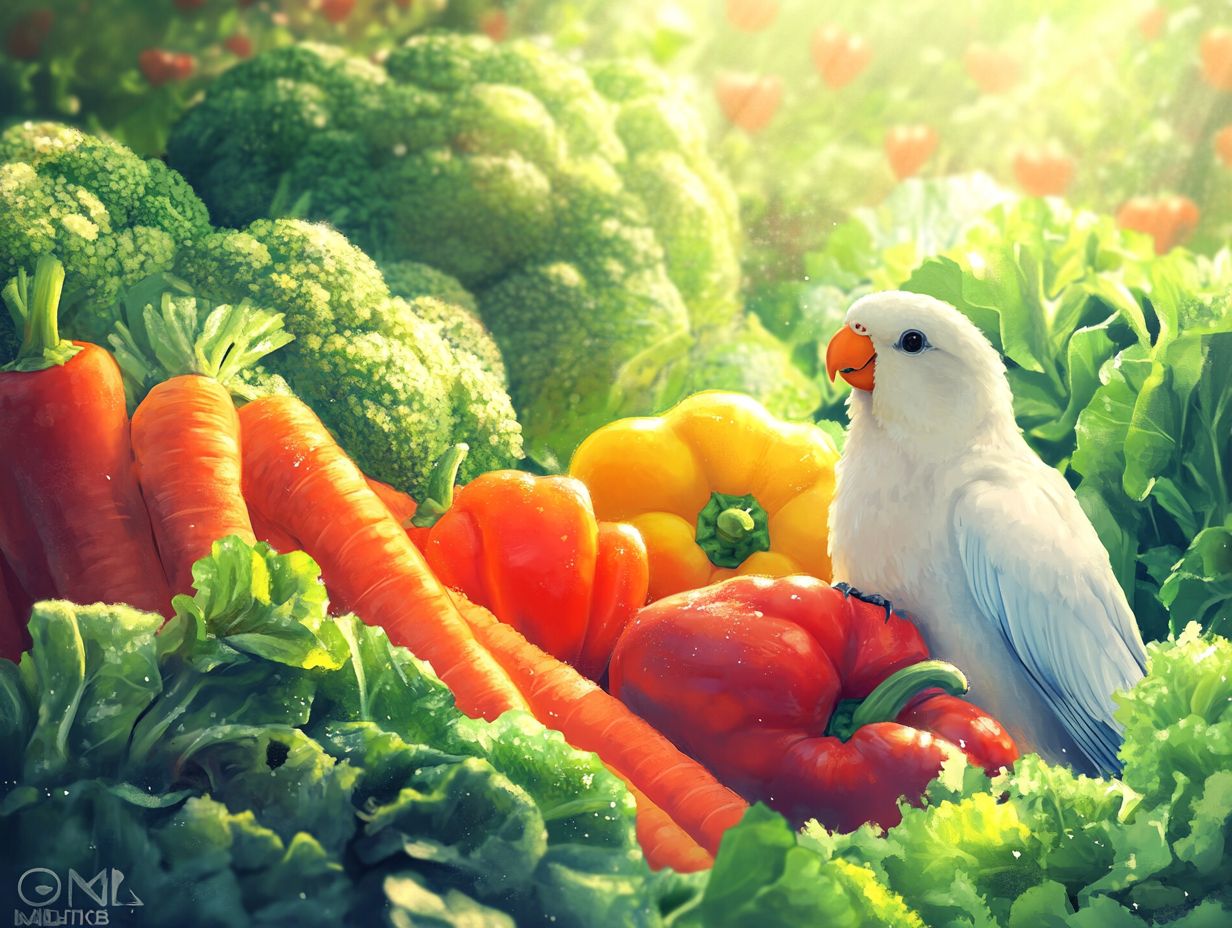
What are the top 5 health benefits of feeding vegetables to my pet bird?
1) Improved Digestion: Vegetables are rich in fiber. This helps promote healthy digestion in pet birds.
2) Boosted Immunity: The vitamins and minerals found in vegetables can help strengthen your bird’s immune system.
3) Healthy Weight Management: Vegetables are low in calories and high in nutrients.
This makes them a great addition to your bird’s diet to maintain a healthy weight.
4) Better Feather Health: The vitamins and minerals in vegetables contribute to healthier and shinier feathers for your pet bird, highlighting the benefits of a varied diet for pet birds.
5) Disease Prevention: Some vegetables, such as leafy greens, are packed with antioxidants. Antioxidants are compounds that help protect the body from damage.
These can help prevent certain diseases in pet birds.
Discover the Best Vegetables for Your Pet Bird!
Leafy greens such as kale, spinach, and broccoli are excellent sources of vitamins and minerals for pet birds. Other beneficial vegetables include carrots, bell peppers, and sweet potatoes.
Feed Your Pet Bird Vegetables Daily for a Vibrant and Healthy Life!
It is recommended to feed your pet bird vegetables every day. However, the amount may vary depending on your bird’s size and nutritional needs.
Are Raw or Cooked Vegetables Better for Pet Birds?
Cooked vegetables are usually easier for pet birds to digest and can also help release more nutrients.
However, some birds may prefer raw vegetables and can benefit from the added texture and stimulation of tearing and chewing them.
Can I Feed My Pet Bird Fruits Instead of Vegetables for the Same Health Benefits?
Fruits can also provide many health benefits for pet birds, but they should not be considered a substitute for vegetables.
Fruits are higher in sugar and should be fed in moderation, while vegetables offer a wider variety of nutrients for your bird.
Are There Any Vegetables That Are Toxic to Pet Birds?
Yes, some vegetables, such as avocado, can be toxic to pet birds. It is important to do research and consult with a veterinarian before introducing new foods to your bird’s diet to ensure their safety and nutritional value.
Ready to Be a Great Bird Parent?
With the right vegetables, your feathered friend will enjoy a healthier, happier life. Don’t wait! Start adding these delicious veggies to your bird’s diet today and watch them thrive!

